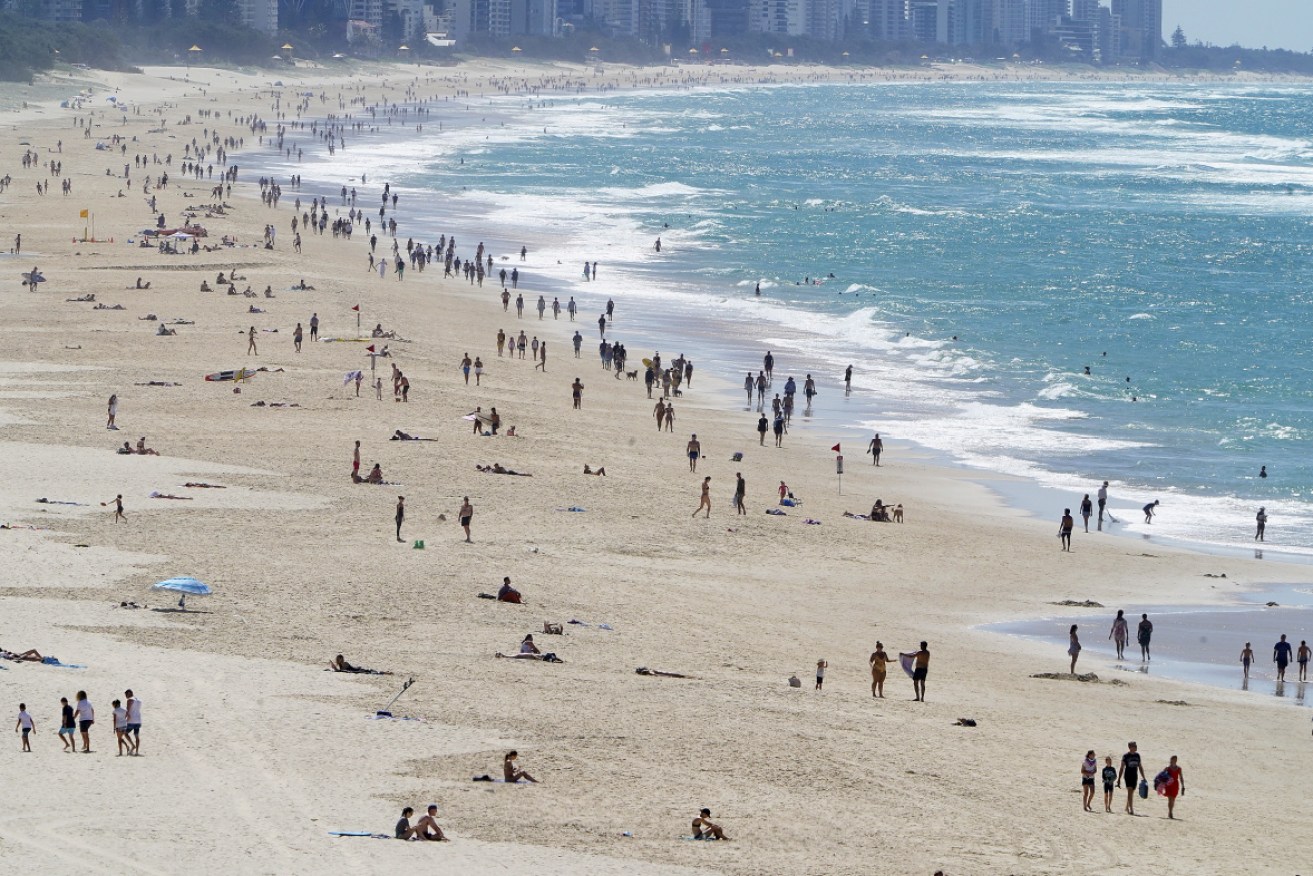Iconic beaches in NSW, Qld reopen with a warning to keep your distance


Beachgoers will have to make sure they use the beach for exercise and swimming, not sitting and relaxing. Photo: AAP
In another small step towards normality, several beaches in NSW and Queensland re-opened on Monday.
Parking restrictions will remain in place but residents will be able to access their nearby beaches in Sydney’s east and on Queensland’s Gold Coast for exercise and swimming provided social distancing is observed.
Gold Coast Mayor Tom Tate said Surfer’s Paradie and Coolangatta beaches have now reopened, but day-trippers have been warned not to be tempted to visit the glitter strip.
Both were closed two weeks ago after crowds of people flocked to the area despite travel restrictions. The Spit and beachfront car parks will remain closed to discourage visitors.
“I want to discourage out-of-towners from coming to our beaches. It is not essential travel. Stay within your postcode,”
He said Gold Coasters had been distancing themselves and reopening the beaches was a one small step toward normality.
- Related: A win for Sydney beachgoers
Meanwhile, Randwick Council, in a virus hotspot, announced on Monday morning it would was taking down its “Closed” signs, re-opening beaches to at least help people get outside and back into popular activities.
Coogee, Maroubra and Clovelly beaches will reopen from Monday morning – strictly for swimming, surfing, walking, running or exercise on the sand (while adhering to social distancing rules).
The council issued a statement on Monday afternoon saying sitting, sunbaking or gathering on the sand was banned.
“People must maintain 1.5 metres between each other, limit groups to two people and move on once they have completed their exercise,” it read.
Randwick’s ocean pools, which were closed with the beaches on March 28, remain off-limits.
NSW Premier Gladys Berejiklian wants people to get out and enjoy the state’s natural beauty but she doesn’t begrudge councils shutting beaches if people don’t do the right thing.
“Everybody knows the rules, we just ask people to stick to them,” she told reporters on Monday.
“It comes down to personal responsibility. We worked so hard to get where we are and if a handful of people do the wrong thing, we’re back to where we were a month ago.”

A ‘beach closed’ sign at Bondi Beach – one of the Sydney beaches where crowds had gathered despite coronavirus bans. Photo: AAP
The barricades and fencing installed by Waverly Council blocking access to Bondi Beach remain.
The popular tourist strip was closed on March 21 after thousands of sunbathers crowded on the sand and surrounding amenities, drawing condemnation around the world.
Coronavirus clusters also broke out among backpackers and others in the area.
Waverley mayor Paula Masselos says Bondi and other local beaches won’t be reopened but the council is looking at ways to provide “managed access to the water” for swimming or surfing.
The area has recorded 180 COVID-19 cases which is more any other council area – ahead of Sydney with 157 and northern beaches at 150.
On the northern beaches, most beaches remain open and patrolled.
But Manly and Dee Why, both identified as coronavirus hotspots, are officially closed leaving those wanting to swim to do so at their own risk.
Lifeguard patrols at all beaches from Newcastle to Gosford’s Umina have ceased but running, swimming, surfing are permitted.
Flags are also down across Wollongong while Sutherland, where some beaches were shut for Easter, has kept its ocean baths out of bounds.
“Living along the coast, I know how important our beaches are to the mental and physical health of so many in the community,” Randwick Mayor Danny Said said.
“Our decision to close the beaches three weeks ago was not taken lightly … particularly given the concentration of COVID-19 cases in the eastern suburbs [of Sydney].
“Our decision was also based upon expected crowd numbers and people’s initial behaviour.”
“The past three weeks have been difficult as we’ve all had to make changes and sacrifices to our daily routines,” he said.
“We appreciate that with the current restrictions in place people are increasingly looking for access to more open spaces including water for their physical and mental well-being.”
-with AAP








